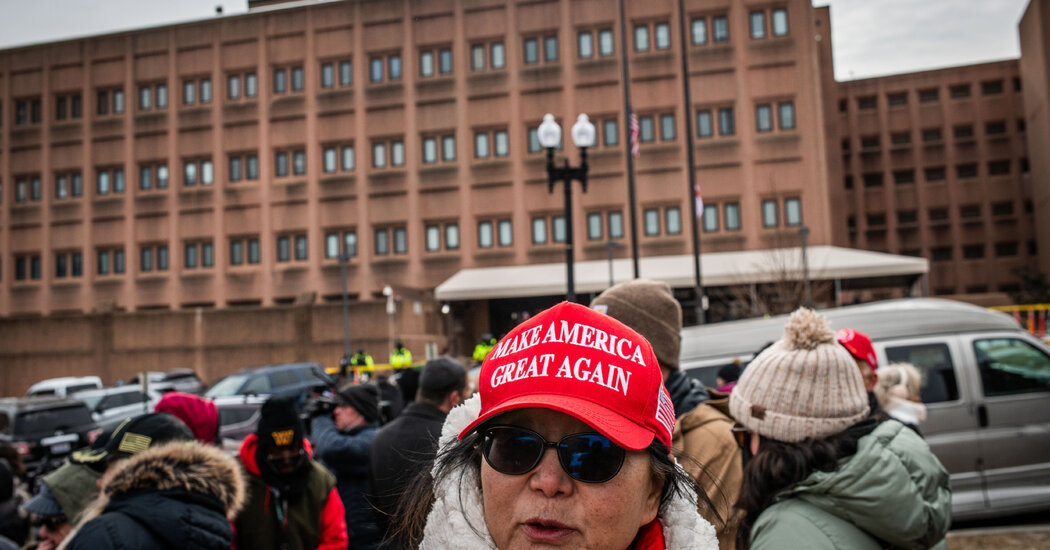No one knows more about the hundreds of criminal cases filed against rioters who took part in the Jan. 6, 2021, storming of the Capitol than the federal judges in Washington who oversaw their trials and guilty pleas, watched thousands of hours of surveillance videos and heard hundreds of witnesses deliver firsthand accounts of the attack.
On Wednesday, two days after President Trump granted sweeping reprieves to all of the nearly 1,600 people charged in connection with the Capitol attack, some of the judges started to push back against his moves, declaring that nothing — not even a presidential decree — could alter the reality of what happened that day.
As part of his pardon order, Mr. Trump directed officials in his Justice Department to start dismissing any related cases that are still active in Federal District Court in Washington, where all of the Capitol riot proceedings have been heard. While the judges there have granted dozens of such motions, some did so in orders reminding the world of the chaos and violence on Jan. 6, when a mob of Mr. Trump’s supporters disrupted the certification of Joseph R. Biden Jr.’s 2020 electoral victory.
“The dismissal of this case cannot undo the ‘rampage that left multiple people dead, injured more than 140 people, and inflicted millions of dollars in damage,’” Judge Tanya S. Chutkan wrote in a decision formally ending the case against John Banuelos, who was charged with firing a pistol into the air on the grounds of the Capitol.
“It cannot diminish the heroism of law enforcement officers who ‘struggled, facing serious injury and even death, to control the mob that overwhelmed them,’” Judge Chutkan continued, quoting court filings in another Jan. 6 case. “It cannot whitewash the blood, feces, and terror that the mob left in its wake. And it cannot repair the jagged breach in America’s sacred tradition of peacefully transitioning power.”
Hours earlier, another judge in the same courthouse, Colleen Kollar-Kotelly, wrote something similar while dismissing the case against Dominic Box, who was found guilty of six counts tied to the Capitol attack.
“Dismissal of charges, pardons after convictions, and commutations of sentences will not change the truth of what happened on Jan. 6, 2021,” Judge Kollar-Kotelly wrote. “What occurred that day is preserved for the future through thousands of contemporaneous videos, transcripts of trials, jury verdicts, and judicial opinions analyzing and recounting the evidence through a neutral lens.”
Even before Mr. Trump issued his clemency declaration — which included pardons, sentence commutations and the directive to dismiss pending charges — one judge in Washington, a Trump appointee, said any expansive form of mercy for the Capitol rioters would be a mistake.
“Blanket pardons for all Jan. 6 defendants or anything close would be beyond frustrating and disappointing, but that’s not my call,” the judge, Carl J. Nichols, said in court in November. “And the possibility of some pardons, at least, is a very real thing.”
Another judge in Washington, Royce C. Lamberth, a former prosecutor appointed by President Ronald Reagan, took pains in a court order filed before Inauguration Day to “clear the air” and “remind ourselves what really happened” on Jan. 6.
Judge Lamberth described in harrowing detail how an angry mob of Trump supporters invaded the Capitol with intentions to “thwart the peaceful transfer of power that is the centerpiece of our Constitution and the cornerstone of our republican legacy”; how they ignored directives to turn back; and how some of the rioters engaged in “pitched battle” with the police, “stampeding through and over the officers.”
Storming of the US Capitol (Jan, 2021),Amnesties, Commutations and Pardons,Chutkan, Tanya S,Kollar-Kotelly, Colleen,Lamberth, Royce C
#Judges #Washington #Push #Trumps #Reprieve #Jan #Defendants

